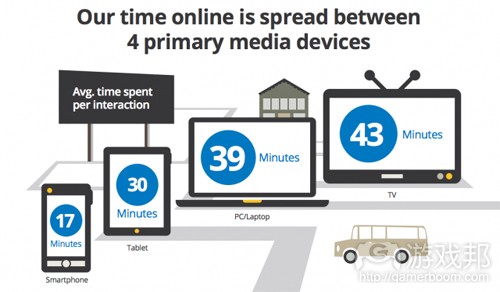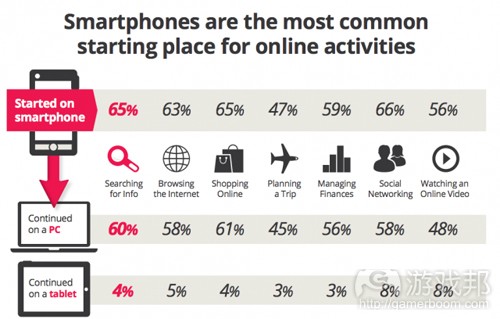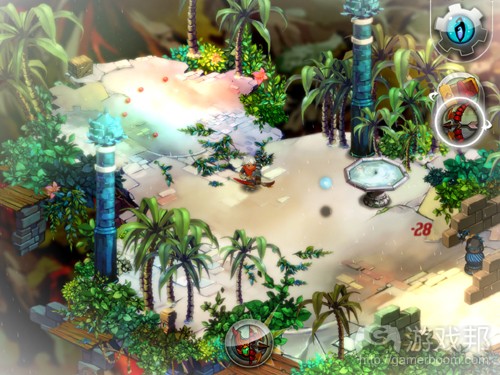每日观察:关注用户在平板电脑等设备的投入时间(8.30)
1)谷歌最新调查结果显示,美国用户在手机、平板电脑、电脑和电视中投入90%的消费媒体内容的时间(或每天4.4小时),但在纸质书籍、平面印刷物或广播上的投入时间甚少。
该调查执行于2012年第二季度,调查样本是1611名用户,他们在此期间向各类媒体中投入近8000小时。调查发现用户平均每次看电视时长达43分钟,但其中有77%时间是一边看电视一边使用智能手机或平板电脑。
用户每次使用智能手机的平均时长仅17分钟,而平板电脑的这一数据则是30分钟,PC是39分钟。
但从设备使用连续性来看,智能手机常是人们最先使用的设备(游戏邦注:例如,用户在手机上看到一部电影,之后转移到电视上继续看;或者在手机上开始一项网购行为,但转移到PC上完成交易)。这意味着媒体内容供应商需考虑到这一点,有效衔接媒体内容在不同设备上的使用体验。
2)据venturebeat报道,手机应用开发商Mobvie.com最近借美国总统大选之势推出《Angry Elections 2012》这款政治讽刺游戏,但不幸被苹果App Store所封杀。
该游戏目前仍可在Google Play、亚马逊App Store下载,它模仿了《愤怒的小鸟》物理机制,支持玩家弹射奥巴马、共和党候选人Mitt Romney,或其他民主党及共和党政治人物。
根据苹果审核政策,该游戏被禁的原因是具有恶意诽谤个人或团体,含有虚假、误导性信息的嫌疑。
3)手机游戏开发商Neon Play日前宣布公司历时两年突破4000万次下载量,其首席执行官Oli Christie认为在未来5年内,iPhone和iPad将呈现堪比掌机的画面效果和处理性能,届时掌机将成为多余之物。未来人人都将持智能手机和平板电脑。
4)据pocketgamer报道,冒险RPG游戏《Bastion》最近入驻新西兰App Store,从其应用描述来看,该游戏目前仅支持运行于iPad 2和新iPad,玩家在其中可探索40多个精致的手绘场景。游戏还绑定了苹果Game Center,提供积分排行榜、成就管理等功能,预计在英国、美国App store上架的售价分别为2.99英磅/4.99美元。
5)Infographic Labs最近发布信息图表显示,有三分之二苹果iPad用户是男性;多数用户年龄介于25-36岁之间,目前iPad用户达5320万,而2010年这一数据仅为1150万。
67%用户使用平板电脑上网,54%用于收发邮件,54%用于看新闻,39%用于访问社交网站,30%用于玩游戏。70%用户边看电视边玩平板电脑,57%用户在床上使用平板电脑,25%在卫生间使用平板电脑。
6)2012年8月28日,网易移动互联网频道正式上线,旨在推介iPhone、Android等平台中热门手机游戏,以及具备代表性的新型产品构想。(本文为游戏邦/gamerboom.com编译,拒绝任何不保留版权的转载,如需转载请联系:游戏邦)
1)If Content Is King, Multiscreen Is The Queen, Says New Google Study
Ingrid Lunden
New research out from Google, working with market analysts Ipsos and Sterling Brands, puts some hard numbers behind the often-noticed trend of how people in the U.S. are using a combination of phones, tablets, computer and TVs to consume digital content.
While each of these has a significant place in our consumption today, their real power lies in how they are used together — in combination, 90% of all of our media consumption, or 4.4 hours per day, is happening across all four (which doesn’t leave much room for paper-based books and publications; or for radio). This not only has implications for how content is designed, but also for how companies like Google will continue to hedge their bets across all four screens.
The state of TV viewing perhaps illustrates consumer usage best of all: polling 1,611 people across 15,738 media interactions and nearly 8,000 hours of activity during Q2, the study found that users are watching TV on average for 43 minutes per day session — the most of any screen — but 77% of that time we are simultaneously using another device like a smartphone or tablet.
The study also found that although a lot of attention is being focused on smartphones and apps, this device is not only the smallest screen in our world, it’s also used for the shortest bursts, at 17 minutes per day session, compared to 30 minutes on tablets, 39 minutes on PCs and the 43 minutes watching TV.
But, while smartphones may have the shortest sessions be used the least overall, they are the most-used when it comes to on-boarding to a digital experience — or sequential device usage, as Google calls it. The research found that a majority of online tasks get initiated on a smartphone while being continued on another device — perhaps with a larger screen for easier use.
That effectively means that while your total content experience perhaps doesn’t need to be designed for a smartphone experience, at least the initial part of it should be, and that part should be integrated with how that content might be used on other devices — so, for example, watching a film first on a phone and then finishing it on a TV, or starting a shopping experience on a phone and finishing it on a PC.(source:techcrunch)
2)Politically inspired Angry Birds clone banned from the App Store
Giancarlo Valdes
With the U.S. presidential election rapidly approaching, it’s no surprise to see developers trying to cash in on the hype. But developer Mobvie.com appears to have went too far with Angry Elections 2012, at least according to Apple’s standards.
“It’s banned in its current form,” said Kevin Moore, the developer of Angry Elections, in a press release sent to GamesBeat. “We are disappointed that Apple has taken such a harsh stance on what we and most people that have played the game find funny, entertaining, and certainly a witty use of political satire.”
Angry Elections 2012 is a physics-based mobile game modeled closely after Rovio’s Angry Birds franchise. You can sling President Barack Obama, presumptive Republican presidential candidate Mitt Romney, or a host of other Democrats and Republicans into the gathering of politicos, and pulling the sling back adds more power to the “ammo” you send flying across the debate stage.
In its original state, which is still available on Google Play and the Amazon App store, Angry Elections had “some of the most notable audio outtakes from the political candidates.” The reasons for the game’s rejection was due to the following Apple review guidelines:
■14.1: Any app that is defamatory, offensive, mean-spirited, or likely to place the targeted individual or group in harm’s way will be rejected.
■22.2: Apps that contain false, fraudulent or misleading representations will be rejected.
“We just recently changed the name to ‘Mad Elections’ and removed the alleged offensive, controversial audio outtakes to address some of Apple’s rejection details and resubmitted back to Apple,” said Moore.(source:venturebeat)
3)Neon Play: Mobile games will replace consoles in under five years
by Zen Terrelonge
Developer says the future of gaming is in the palm of your hand.
Games publisher EA continues to make its fondness of mobile known, admitting it will become digital-only in the future, a snub to its video game heritage.
Meanwhile, recent data from PopCap shows that 125m people use handheld games devices in the UK and US, with most of the mobile play taking place indoors.
SuperData also found that the mobile games market is set to be worth £4.8bn by 2015, a near threefold growth on today.
Mobile games studio Neon Play crossed the 40m downloads milestone yesterday, achieved in two years, and CEO Oli Christie reckons consoles are on the way out.
Christie, said: “In less than five years, your iPhone or your iPad will be console-quality in terms of the graphics and processing power…You won’t need a console any more.
“Everyone will have a smartphone and tablet, and there will be a multi-billion dollar mobile gaming market.”
However, Xbox creator Seamus Blackley would surely argue with the comments, recently saying that mobile games complement consoles.
Video Games Intelligence has compiled a free mobile games white paper, which covers freemium, in-app ads and more.(source:mobile-ent)
4)Award-winning console RPG Bastion debuting on iPad tomorrow
by Matthew Diener
We’ve been hoping Supergiant would port its adventure-RPG Bastion over to the App Store for some time. Well, the wait is finally over.
Bastion has gone live on the New Zealand App Store, meaning it will be available to download in the UK and US later this evening.
According to its App Store description, Bastion is only compatible with the iPad 2 and the new iPad – sorry, owners of the original iPad.
In the game itself, you will get to explore over 40 lush hand-painted environments in your quest to discover the secrets of the Calamity, “a surreal catastrophe that shattered the world to pieces”.
Before you ask, Bastion does support Apple’s social gaming network Game Center. You know, leaderboards, achievements, and that sort of stuff.
When it goes live on the UK and US App Stores later tonight, Bastion will set you back £2.99 / $4.99. Enjoy.(source:pocketgamer)
5)INFOGRAPHIC: The iPad is the number one tablet, but who’s using it?
by Zen Terrelonge
For a start, 66 per cent of owners are male.
The iPad continues to slay every hint of competition on the tablet market, and with three versions now available, Infographic Labs has observed just exactly who uses the Apple devices.
Interestingly, it seems to be a boys toy as males occupy two-thirds of the ownership.
Most users are aged between 25 and 36, and 53.2m people now own an iPad, compared to 11.5m in 2010.(source:mobile-ent)












































 闽公网安备35020302001549号
闽公网安备35020302001549号